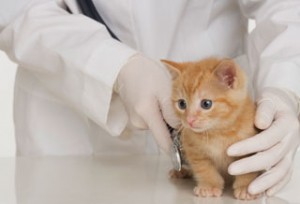 New dog owners often wonder why their adorable new puppy or dog can’t stop scratching at his ears. Could it be fleas or ticks? Yes, it could be all of the above! But more often than not, incessant itching and scratching in the ear area is caused by an infection. In fact, according to a recent survey conducted by Veterinary Pet Insurance, ear problems are the second most common reason dog owners bring their pets to the vet.
New dog owners often wonder why their adorable new puppy or dog can’t stop scratching at his ears. Could it be fleas or ticks? Yes, it could be all of the above! But more often than not, incessant itching and scratching in the ear area is caused by an infection. In fact, according to a recent survey conducted by Veterinary Pet Insurance, ear problems are the second most common reason dog owners bring their pets to the vet.
Causes of Ear Infections in Dogs
There are many reasons dogs get ear infections, which is what makes them so difficult to diagnose. In most cases, yeast or bacteria are to blame. But infections can also be precipitated by mites, trapped water, hair growth and even tumors in the ear canal.
Activities that put dogs at an elevated risk of this painful disorder include frequent bathing, swimming, and improper cleaning routines that can lead to ear infections. Pet lovers must always remember that a dog’s ear is not like ours! The canine’s plunges downward from the opening and then goes horizontally, which is why water and debris can easily get lodged in there.
Symptoms of Ear Infections in Dogs
In addition to scratching and itching, a dog with an ear infection may also shake his head, as if he is trying to get water out of it. In some advanced cases, there may be an unpleasant odor that can be detected even from a distance. But those are just the tip of the proverbial iceberg. The following is a brief list of common symptoms for canine ear infections:
- Redness (due to scratching)
- Swelling
- Yellow, brown, or bloody discharge
- Hair loss around the ear (also do to scratching)
- Scabby skin near the ear flap
- Bad balance while walking
- Diminished hearing
- Disorientation
At-risk breeds for Ear Infections
Although any dog can get an ear infection at anytime, certain breeds are more susceptible to the ailment than others. A short list of breeds that are prone to ear infections includes: Springer Spaniel, Shar Pei, Basset Hound, Beagle, Labrador, and Cocker Spaniel, just to name a few. The reason these pouches have more ear problems than other dog breeds is often attributed to sensitive skin on the inside of their ears and ear canals.
Prevention of Ear Infections in Dogs
If you own a water dog, one that swims like an Olympian and loves the water, make sure you dry their ears after each and every swimming session. Using cotton balls, simply wipe the opening gently, which should be enough to remove surface moisture and prevent infection. You may also be able to use a drying solution, if your veterinarian says it’s okay. A drop or two of white vinegar can also help prevent “swimmer’s ear” in our canine friends. But once again, make sure you speak with your dog’s doctor before you administer anything.
For dogs that don’t swim but are merely bathed on a regular basis, you can keep water out of their sensitive ears by inserting cotton balls into both ear canals. Just be gentle and don’t push too hard. All you have to do is cover the opening and your dog should be okay during an ordinary bathing session.
Treatment of Ear Infections in Dogs
There are many inexpensive and effective treatments for canine ear infection on the market today. One of our favorites is Tri-otic Ointment for Dogs. A safe and readily available generic form of Otomax, this medication provides quick and soothing relief to red, swollen, itchy ears. It does this by attacking the bacteria and yeast that caused the infection, thereby reducing inflammation and itching. How does it work?
Tri-otic Ointment combines three powerful antimicrobials into a single solution that treats ear infections. These ingredients work together to stop the yeast and bacteria from spreading and quickly eliminate any sign of the infection in no time.
As with any prescription medication, always follow dosing directions to the letter. Even when a dose is missed, never double up or administer more than is directed, unless your veterinarian approves it. Don’t hesitate to contact us!
Have a great Halloween,
VetRxDirect





